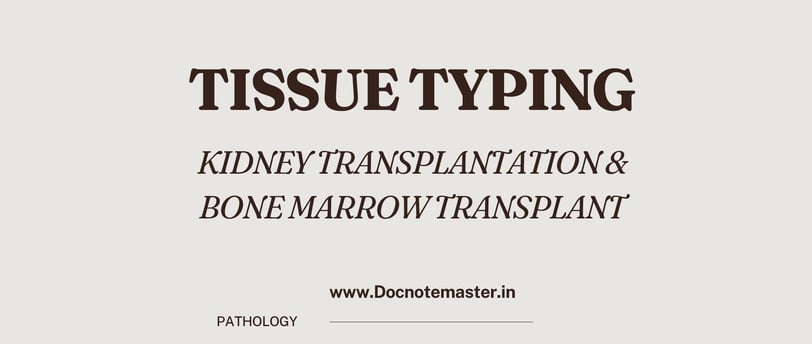online learning with Doc note master|| Himanshu paneru
Tissue typing for kidney transplantation & bone marrow transplantation
Tissue typing, also known as histocompatibility testing or human leukocyte antigen (HLA) typing.
PATHOLOGY
Himanshu Paneru
2/24/20244 मिनट पढ़ें


TISSUE TYPING FOR KIDNEY TRANSPLANTATION AND BONE MARROW TRANSPLANT
Tissue typing, also known as histocompatibility testing or human leukocyte antigen (HLA) typing.
It is a procedure in which tissue of donor & recipient are compatibility prior to transplantation.
Mismatch donor & recipient tissue can lead to rejection of the tissue.
Tissue typing method ensure that an organ from a donor will be compatible with its recipient
The process start by identify HLA for organ donor & recipient either from blood or tissue.
NOTE: organ & tissue donation is often referred to as the ‘’Gift of life’’. A single donor has the potential to save up to eight life through organ donation & had more than 75 through tissue donation.
Human leukocyte antigen (HLA):
HLA stands for Human Leukocyte Antigen.
HLAs are a group of proteins found on the surface of cells in the body.
Play a crucial role in the immune system
HLA helping the body to differenciate between its own cells & foreign particle.
MATCHING & COMPATIBILTY IN ORGAN TRANSPLANTATION
The 3 type of test done to evaluate donors before transplantation are –
Blood grouping
HLA typing
Cross match
Blood grouping:
Blood grouping is the first step for determine if your blood is a compatible match with the potential donor blood.
Tissue typing:
Tissue typing also called HLA typing
HLA are proteins present on the surface of cells
Out of over 100 different antigen there are six which are the most important in organ transplantation
From these six antigen body inherit 3 antigen from each parents.
Cross match:
The cross match test is very important part of this procedure
If the cross match is negative the pair is considered compatible
ORGAN TRANSPLANTATION
Based on genetic relationship between donor & recipient
Autograft: self tissue transfer from one part of the body to another
Example – transferring healthy skin to burn skin
Isograft: tissue transferred between genetically identical individual (twins)
Allograft: tissue transferred between genetically non-individual (kidney transplantation)
Kidney transplant
A kidney transplant is a surgical procedure in which a kidney is removed from one person (donor) & place to another person (recipient) who is suffering from renal failure & the transplanted kidney perform all the function which the patient kidney is not able to perform.
Kidney transplantation is typically considered for individuals with end-stage kidney disease whose kidneys can no longer for performing function.
Common causes of renal failure include
o Chronic kidney disease
o Diabetes, hypertension
o Glomerulonephritis
o Polycystic kidney disease, etc.
Importance of kidney transplantation
When a person is suffering from Renal failure the kidney do not work properly even kidney do not filter waste product as a result excessive waste & harmful chemical starts to accumulate in blood, it cause a condition called uremia.
Patient who is suffering from renal failure has two option for treatment.
1. Dialysis: the procedure where the waste product from blood is removed artificially.
2. Kidney transplantation:
Procedure before transplantation
o Before transplant both recipient & donor undergo for medical assessment.
o This includes overall health, kidney function, blood type compatibility, tissue typing, & other medical conditions that could affect the transplant process.
Donor selection
o Donor for transplantation can be living donors or deceased donors.
o Living donors are typically family members or close friends who donate their kidneys.
o Deceased donors are individuals who have consented to organ donation either before death or through their family after death.
Surgery
o The kidney transplant surgery involves removing the diseased kidney & implanting the healthy kidney from the donor.
o The new kidney is usually placed in the lower abdomen, near the pelvis.
Post transplant process
o Regular check-up is necessary after transplant due to medical condition small things will recognize for patient health.
Advantage of transplantation over dialysis
People who undergo kidney transplant do not require daily dialysis treatment
Kidney transplant is permanent treatment while dialysis is temporary
Patient with transplant can live longer compared with dialysis patient
A women will able to concive child after successful transplant
Dialysis can cause other serious health condition such as
o Anemia
o Heart disease
o Infection
o High blood pressure
Bone marrow transplantation
Bone marrow transplantation also known as hematopoietic stem cell transplantation.
It is a medical procedure used to replace damaged or diseased bone marrow with healthy stem cells.
Bone marrow transplantation is typically considered for individuals with certain types of cancers, such as leukemia, lymphoma & multiple myeloma, as well as certain non-malignant conditions, such as aplastic anemia, thalassemia & severe immune deficiencies.
Procedure before transplantation:
o Before bone marrow transplant, both recipient & donors undergo medical evaluation.
o This involves assessment overall health, recipient's organ function & human leukocyte antigen (HLA) matching.
Donor selection:
o Bone marrow donors can be either relative (usually siblings) or unrelated individuals who are compatible matches based on HLA typing.
o In some cases, umbilical cord blood from newborns may also be used as a source of stem cells for transplantation.
Transplantation:
o Bone marrow transplantation procedure involves infusing the healthy stem cells into the recipient bloodstream through a vein. The stem cells then travel to the bone marrow, where they begin to produce new blood cells, including red blood cells, white blood cells, and platelets.
Post transplant care:
o Bone marrow transplantation patient required daily monitoring for complication such as graft-versus-host disease (GVHD), infections, and organ toxicity.
Advantage of bone marrow transplantation
Bone marrow transplantation can provide permanent cure for various diseases, including leukemia, lymphoma, multiple myeloma, aplastic anemia, & certain genetic disorders.
It is used to treat certain genetic disorders that affect the blood & immune system, such as sickle cell disease, thalassemia, etc.
Successful bone marrow transplantation can significantly improve the quality of life for individuals with hematologic malignancies and other blood disorders
